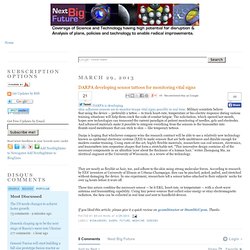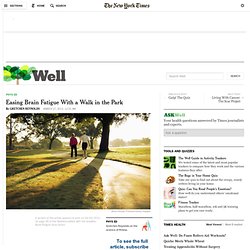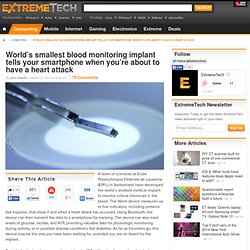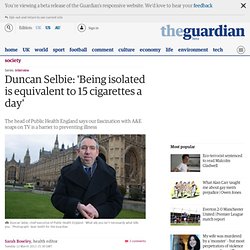

Patients’ Genes Seen as Future of Cancer Care. How the Pre-Penicillin Era Could Help Combat Antibiotic Resistance. DARPA developing sensor tattoos for monitoring vital signs. DARPA is developing skin-adherent sensors are to monitor troops vital signs possibly in real time.

Military scientists believe that using the device — preferably a tattoo — to track heart-rate, temperature or bio-electric response during various training situations will help them crack the code of combat fatigue. The solicitation, which opened last month, hopes new technologies can transcend the current paradigm of patient monitoring of needles, gels and electrodes.
And advanced materials make it possible to integrate everything from the sensors to the transmitter into thumb-sized membranes that can stick to skin — like temporary tattoos. Darpa is hoping that whichever company wins the research contract will be able to use a relatively new technology known as epidermal electronic systems (EES) to make sensors that are both unobtrusive and durable enough for modern combat training. They are nearly as flexible as hair, too, and adhere to the skin using strong molecular forces. Easing Brain Fatigue With a Walk in the Park. Brick House Pictures/Getty Images Phys Ed Gretchen Reynolds on the science of fitness.

Fitness Tracker Marathon, half-marathon, 10K and 5K training plans to get you race ready. Scientists have known for some time that the human brain’s ability to stay calm and focused is limited and can be overwhelmed by the constant noise and hectic, jangling demands of city living, sometimes resulting in a condition informally known as brain fatigue. With brain fatigue, you are easily distracted, forgetful and mentally flighty — or, in other words, me. But an innovative new study from Scotland suggests that you can ease brain fatigue simply by strolling through a leafy park. The idea that visiting green spaces like parks or tree-filled plazas lessens stress and improves concentration is not new. But this theory, while agreeable, has been difficult to put to the test. But it had not been possible to study the brains of people while they were actually outside, moving through the city and the parks.
World’s smallest blood monitoring implant tells your smartphone when you’re about to have a heart attack. A team of scientists at Ecole Polytechnique Fédérale de Lausanne (EPFL) in Switzerland have developed the world’s smallest medical implant to monitor critical chemicals in the blood.

The 14mm device measures up to five indicators, including proteins like troponin, that show if and when a heart attack has occurred. Using Bluetooth, the device can then transmit the data to a smartphone for tracking. The device can also track levels of glucose, lactate, and ATP, providing valuable data for physiologic monitoring during activity, or in possible disease conditions like diabetes. As far as tricorders go, this device may be the one you have been waiting for, provided you are on board for the implant. Outside the body, a battery patch provides the 100 milliwatts of power that the device requires by wireless inductive charging through the skin. At the moment the device has a limited number of sensors, but there is no theoretical ceiling on this. Duncan Selbie: 'Being isolated is equivalent to 15 cigarettes a day' Duncan Selbie is about to attempt to help bring about a sea change in public healthcare.

As chief executive of Public Health England (PHE), which officially starts work on 1 April as the body established to protect and improve public health and reduce inequalities, he is touring the country forging relationships with councillors and local officials. The 152 top-tier local authorities are about to take over the public health budget, worth £5.45bn over two years and ringfenced for public health rather than hospital care for the first time, as well as responsibility for public health in their areas. Their health and wellbeing boards must decide how to tackle everything from smoking and obesity to sexual health and loneliness. Selbie's contributions on public health to academic journals could be written on a postage stamp. But it doesn't matter, he says in his soft Scottish accent with a big, disarming grin. Prevention Selbie understands the problem. Selbie knows about social disadvantage. Can a Radical New Treatment Save Children With Severe Food Allergies?